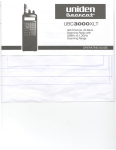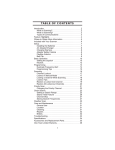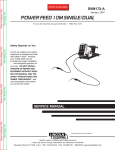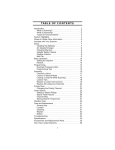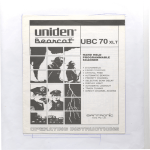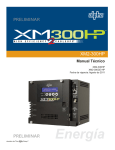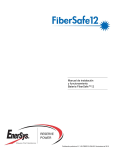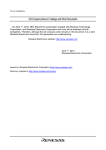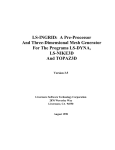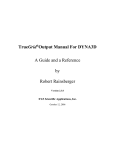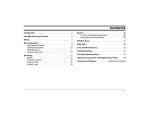Download Uniden BC80XLT Specifications
Transcript
2 31 30 3 Precautions Before you use this scanner, please read and observe the following: Earphone Warning! Be sure to use only the recommended optional monaural earphone (EPOO9). You may also use a 32Q stereo headset. Use of an incorrect earphone or stereo headset may be potentially hazardous to your hearing. The output of the Phone jack is monaural, but you will hear it in both headphones of a stereo headset. Set the Volume to a comfortable audio level coming from the speaker before plugging in the monaural earphone or a stereo headset of the proper impedance (32Q). Otherwise you might experience some discomfort or possible hearing damage if the Volume suddenly becomes too loud because of the Volume Control or Squelch Control setting. This may be particularly true of the type of earphone that is placed in the ear canal. WARNING! Uniden does not represent this unit to be waterproof. To reduce the risk of fire or electrical shock, do not expose this unit to rain or moisture. IMPORTANT! The installation, possession, or use of this scanning radio in a motor vehicle may be prohibited, regulated, or require a permit in certain states, cities, and/or local jurisdiction. Your local law enforcement officials should be able to provide you with information regarding the laws in your community. General Battery Warning! Do not short-circuit any Battery. Do not discard Batteries in a fire; they may explode. Alkaline Battery Warning! Do not recharge Alkaline Batteries in this product. Doing so may cause serious damage to the product and will void the warranty. Uniden does not recommend using rechargeable Alkaline Batteries in this product. Nickel-Cadmium Battery Warning! When using Nickel-Cadmium Batteries with this product, take note of the following warnings: Cadmium is a chemical known to the State of California to cause cancer. Do not charge Nickel-Cadmium Batteries with any charger other than the one supplied with this product. Using another charger may damage the Batteries, or cause them to explode. Nickel-Cadmium Batteries must be disposed of properly Residents of Minnesota should contact 1-800-225-PRBA for information concerning reclamation and disposal of nickel-cadmium batteries. Residents outside of Minnesota should contact their local authorities for information concerning reclamation and disposal of nickel-cadmium batteries. Uniden and Bearcat are registered trademarks of Uniden America Corporation. 4 29 Contents Introduction What is Scanning? What is Searching? Types of Communications Feature Highlights Scanner Care & Safety Tips Where to Obtain More Information Included with your Scanner Setup Power Install Batteries AC Adapter/Charger Flexible Antenna Belt Clip Basic Operation How Squelch Works Setting the Squelch Key-Lock Programming Programming Tips Scanning Banks Channel Lockout Lockout in Manual Mode Locking a Channel While Scanning. Lockout Tips Restore a Locked Out Channel . . . Restore All Locked-out Channels. . Priority Scan Changing the Priority Channel Search Access Frequencies Manually Storing Search Frequencies Weather Scan Care and Maintenance General Use Location Cleaning Repairs Birdies Troubleshooting Technical Specifications Warranty 28 6 6 6 6 7 7 7 8 9 9 9 10 11 11 12 12 12 13 14 15 16 18 18 18 19 17 17 20 20 21 22 24 25 27 28 28 28 28 28 28 29 30 31 5 Introduction The BC80XLT is a new state-of-the-art radio with scanning capabilities. Store frequencies into 5 banks of 10 channels each. What is Scanning? Unlike standard AM or FM radio stations, most two-way communications (listed on this page) do not transmit continuously. The BC80XLT scans programmed channels until it finds an active frequency. Scanning stops on an active frequency, and remains on that channel as long as the transmission continues. When the transmission ends, the scanning cycle resumes until another transmission is received. While the BC8OXLT scans channels, it is in Scan mode. When you stop scanning with “MANUAL” it is in Manual mode. What is Searching? The BC80XLT can search 11 bands to find active frequencies. This gives you the opportunity to find new frequencies that have not been programmed. While the BC80XLT searches for active frequencies, it is in Search mode. When you stop the search with “HOLD” it is in Search Hold mode. Types of Communications Monitor communications such as: • Police and fire department (including rescue and paramedics) • NOAA weather broadcasts (preprogrammed channels) • Business/industrial radio • Motion picture and press relay • Utility • Land transportation frequencies, such as trucking firms, buses, taxis, tow trucks, and railroads • Marine and amateur (ham radio) bands • And more in the following 11 Bands: Frequency Range Transmission 29-29.7 29.7-50 50-54 137-144 144-148 148-174 406-420 420-450 450-470 470-512 806-956 6 MHz 10 Meter Amateur Band MHz VHF Low Band MHz 6 Meter Amateur Band MHz Military Land mobile MHz 2 Meter Amateur Band MHz VHF High Band MHz Federal Govt. Land Mobile MHz 70 cm Amateur Band MHz UHF Standard Band MHz UHF “T” Band MHz Public Service Band except Cellular Band 27 Feature Highlights 50 Channels — Program one frequency into each channel. You must have at least one channel programmed to use the Scan mode. 29 MHz-956 MHz — Search these frequency ranges with your scanner. (The frequency coverage is not totally continuous from 29 MHz to 956 MHz.) 5 Priority Channels — Assign one Priority channel in each bank. Keep track of the activity on most important channel(s) while monitoring others. Manual Channel Access — Go directly to any channel. Memory Backup — Frequencies programmed in the channels are retained in memory. If the power is disconnected, the memory retains the frequencies for 7 days. Weather Scan — Use as a weather information radio. Preset 2-Second Delay — Scanner waits 2 seconds after transmission stops before resuming scanning. Scanner Care & Safety Tips Do not use the scanner in high-moisture areas such as the kitchen or bathroom. Do not plug the scanner into an outlet controlled by a wall switch as prolonged periods without power causes scanner memory loss. Avoid placing the unit in direct sunlight or near heating elements or vents. Where to Obtain More Information Before you can scan, you must program a frequency into each channel you want to use. The “Betty Bearcat Scanner Frequency Guide” lists typical frequencies used around the U.S. and Canada that you may program into the BC80XLT. If the frequencies listed in the “Betty Bearcat Starter Frequency Guide” do not work in your area, call the enclosed “Mr. Scanner” 800 number. A Uniden representative should be able to provide you with a few sample frequencies. Or, use the enclosed order form to purchase a local frequency list. The Bearcat Radio Club and other similar hobby clubs have publications, information on computer bulletin boards, and even contests for the radio enthusiast. Also, your local library has more information. 26 7 Included With Your Scanner 8 25 24 9 Warning! Do not mix alkaline batteries with nickel-cadmium batteries. Be sure to install 4 batteries of the same type. Warning! Use only the supplied AC Adapter (AD7OU) or one of the optional power cords (UA502 or UA51O). Battery Warning! Do not charge alkaline batteries in this scanner. Doing so may cause serious damage to the product and void the warranty. Before attempting to recharge batteries, make sure you have installed 4 rechargeable nickel-cadmium batteries and the selector switch is set to Ni-Cd. Caution The AC Adapter included with this scanner may be equipped with a polarized alternating line plug (a plug with one blade wider that the other.) This plug will fit into the power outlet only ope way. If you are unable to insert the plug fully into the outlet, try reversing the plug. If the plug should still fail to fit, contact an electrician to replace the obsolete outlet. Do not alter the shape of the blades to the polarized plug. Note: Changes or modifications to this product not expressly approved by Uniden, or operation of this product in any way other than as detailed by the owner’s manual, could void your authority to operate this product. AC Adapter/Charger Use the AC Adapter/Charger to power the BC80XLT from the AC outlet. 10 23 22 11 12 21 20 13 14 19 18 15 16 17 16 17 18 15 14 19 20 13 12 21 22 11 Warning! Do not mix alkaline batteries with nickel-cadmium batteries. Be sure to install 4 batteries of the same type. Warning! Use only the supplied AC Adapter (AD7OU) or one of the optional power cords (UA502 or UA51O). Battery Warning! Do not charge alkaline batteries in this scanner. Doing so may cause serious damage to the product and void the warranty. Before attempting to recharge batteries, make sure you have installed 4 rechargeable nickel-cadmium batteries and the selector switch is set to Ni-Cd. Caution The AC Adapter included with this scanner may be equipped with a polarized alternating line plug (a plug with one blade wider that the other.) This plug will fit into the power outlet only ope way. If you are unable to insert the plug fully into the outlet, try reversing the plug. If the plug should still fail to fit, contact an electrician to replace the obsolete outlet. Do not alter the shape of the blades to the polarized plug. Note: Changes or modifications to this product not expressly approved by Uniden, or operation of this product in any way other than as detailed by the owner’s manual, could void your authority to operate this product. AC Adapter/Charger Use the AC Adapter/Charger to power the BC80XLT from the AC outlet. 10 23 24 9 Included With Your Scanner 8 25 Feature Highlights 50 Channels — Program one frequency into each channel. You must have at least one channel programmed to use the Scan mode. 29 MHz-956 MHz — Search these frequency ranges with your scanner. (The frequency coverage is not totally continuous from 29 MHz to 956 MHz.) 5 Priority Channels — Assign one Priority channel in each bank. Keep track of the activity on most important channel(s) while monitoring others. Manual Channel Access — Go directly to any channel. Memory Backup — Frequencies programmed in the channels are retained in memory. If the power is disconnected, the memory retains the frequencies for 7 days. Weather Scan — Use as a weather information radio. Preset 2-Second Delay — Scanner waits 2 seconds after transmission stops before resuming scanning. Scanner Care & Safety Tips Do not use the scanner in high-moisture areas such as the kitchen or bathroom. Do not plug the scanner into an outlet controlled by a wall switch as prolonged periods without power causes scanner memory loss. Avoid placing the unit in direct sunlight or near heating elements or vents. Where to Obtain More Information Before you can scan, you must program a frequency into each channel you want to use. The “Betty Bearcat Scanner Frequency Guide” lists typical frequencies used around the U.S. and Canada that you may program into the BC80XLT. If the frequencies listed in the “Betty Bearcat Starter Frequency Guide” do not work in your area, call the enclosed “Mr. Scanner” 800 number. A Uniden representative should be able to provide you with a few sample frequencies. Or, use the enclosed order form to purchase a local frequency list. The Bearcat Radio Club and other similar hobby clubs have publications, information on computer bulletin boards, and even contests for the radio enthusiast. Also, your local library has more information. 26 7 Introduction The BC80XLT is a new state-of-the-art radio with scanning capabilities. Store frequencies into 5 banks of 10 channels each. What is Scanning? Unlike standard AM or FM radio stations, most two-way communications (listed on this page) do not transmit continuously. The BC80XLT scans programmed channels until it finds an active frequency. Scanning stops on an active frequency, and remains on that channel as long as the transmission continues. When the transmission ends, the scanning cycle resumes until another transmission is received. While the BC8OXLT scans channels, it is in Scan mode. When you stop scanning with “MANUAL” it is in Manual mode. What is Searching? The BC80XLT can search 11 bands to find active frequencies. This gives you the opportunity to find new frequencies that have not been programmed. While the BC80XLT searches for active frequencies, it is in Search mode. When you stop the search with “HOLD” it is in Search Hold mode. Types of Communications Monitor communications such as: • Police and fire department (including rescue and paramedics) • NOAA weather broadcasts (preprogrammed channels) • Business/industrial radio • Motion picture and press relay • Utility • Land transportation frequencies, such as trucking firms, buses, taxis, tow trucks, and railroads • Marine and amateur (ham radio) bands • And more in the following 11 Bands: Frequency Range Transmission 29-29.7 29.7-50 50-54 137-144 144-148 148-174 406-420 420-450 450-470 470-512 806-956 6 MHz 10 Meter Amateur Band MHz VHF Low Band MHz 6 Meter Amateur Band MHz Military Land mobile MHz 2 Meter Amateur Band MHz VHF High Band MHz Federal Govt. Land Mobile MHz 70 cm Amateur Band MHz UHF Standard Band MHz UHF “T” Band MHz Public Service Band except Cellular Band 27 Contents Introduction What is Scanning? What is Searching? Types of Communications Feature Highlights Scanner Care & Safety Tips Where to Obtain More Information Included with your Scanner Setup Power Install Batteries AC Adapter/Charger Flexible Antenna Belt Clip Basic Operation How Squelch Works Setting the Squelch Key-Lock Programming Programming Tips Scanning Banks Channel Lockout Lockout in Manual Mode Locking a Channel While Scanning. Lockout Tips Restore a Locked Out Channel . . . Restore All Locked-out Channels. . Priority Scan Changing the Priority Channel Search Access Frequencies Manually Storing Search Frequencies Weather Scan Care and Maintenance General Use Location Cleaning Repairs Birdies Troubleshooting Technical Specifications Warranty 28 6 6 6 6 7 7 7 8 9 9 9 10 11 11 12 12 12 13 14 15 16 18 18 18 19 17 17 20 20 21 22 24 25 27 28 28 28 28 28 28 29 30 31 5 Precautions Before you use this scanner, please read and observe the following: Earphone Warning! Be sure to use only the recommended optional monaural earphone (EPOO9). You may also use a 32Q stereo headset. Use of an incorrect earphone or stereo headset may be potentially hazardous to your hearing. The output of the Phone jack is monaural, but you will hear it in both headphones of a stereo headset. Set the Volume to a comfortable audio level coming from the speaker before plugging in the monaural earphone or a stereo headset of the proper impedance (32Q). Otherwise you might experience some discomfort or possible hearing damage if the Volume suddenly becomes too loud because of the Volume Control or Squelch Control setting. This may be particularly true of the type of earphone that is placed in the ear canal. WARNING! Uniden does not represent this unit to be waterproof. To reduce the risk of fire or electrical shock, do not expose this unit to rain or moisture. IMPORTANT! The installation, possession, or use of this scanning radio in a motor vehicle may be prohibited, regulated, or require a permit in certain states, cities, and/or local jurisdiction. Your local law enforcement officials should be able to provide you with information regarding the laws in your community. General Battery Warning! Do not short-circuit any Battery. Do not discard Batteries in a fire; they may explode. Alkaline Battery Warning! Do not recharge Alkaline Batteries in this product. Doing so may cause serious damage to the product and will void the warranty. Uniden does not recommend using rechargeable Alkaline Batteries in this product. Nickel-Cadmium Battery Warning! When using Nickel-Cadmium Batteries with this product, take note of the following warnings: Cadmium is a chemical known to the State of California to cause cancer. Do not charge Nickel-Cadmium Batteries with any charger other than the one supplied with this product. Using another charger may damage the Batteries, or cause them to explode. Nickel-Cadmium Batteries must be disposed of properly Residents of Minnesota should contact 1-800-225-PRBA for information concerning reclamation and disposal of nickel-cadmium batteries. Residents outside of Minnesota should contact their local authorities for information concerning reclamation and disposal of nickel-cadmium batteries. Uniden and Bearcat are registered trademarks of Uniden America Corporation. 4 29 30 3 2 31
































